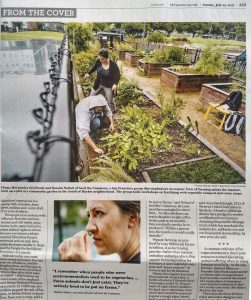A few years ago, I was at an impasse. I wanted to help grow the food movement but I refused to promote animal agriculture, and there didn’t seem to be any other option.
Early on, I had come to think of food systems and land use as vital areas of activism to create a better world. I sought out opportunities to support groups who defended food from corporate takeover, but the problem was that in promoting alternatives to industrial agriculture, they defaulted to models that included farm animals. This not only legitimized animal exploitation but created a false dichotomy in which veganism necessarily fell outside of sustainable agriculture. In fact, many people in the food movement were ex-vegans and vegetarians who were caught up in this view.
I remained vegan because I didn’t look to veganism as a “solution” that I weighed up against other solutions like agroecology or permaculture. Rather, it was a basic daily ethic, no different than my refusal to be violent towards a cat or dog. I didn’t want to compromise on this to engage in the important activism happening around me, so I resolved that I would only work on projects where I could promote a plant-based version of agroecology.

This meant starting my own projects, and it wasn’t easy. Information on veganics was hard to come by and farmers were few and far between. Nonetheless, with extremely few resources, we pulled together our first People’s Harvest Forum in 2015. We were joined by veganic growers from California, Georgia, Kentucky and England. Even if nobody else showed up, we would hold a veganic space (incidentally, Veganic Space was the original intended name of the forum).
But people did show up, and the forum presented what was probably the very first panel on agroecology in which all of the speakers were vegan agroecologists. Since then, we have continued to build the visibility of veganic farmers and their methods. Less than two years later, Seed the Commons was featured in the San Francisco Chronicle for our work promoting veganic agriculture. I am proud to say that in the Bay Area, veganics have been popularized.
Of course, there is still a lot to do. Farmers need better access to veganic education, mentorship and community; activists need to know that food can be grown sustainably without animal exploitation; consumers need an option that goes beyond organic. For all these reasons, we are very excited to share a new map on Veganic World, a veganic resource center created by Seed the Commons. This map is an ongoing project of Dr. Mona Seymour, who is researching veganic farms in the United States to provide this resource for the veganic movement.
So grab a cup of tea, browse our map and find a farm near you: they may host visitors or have a CSA you can join. Read our profiles of veganic farmers and share them with friends and fellow activists. And if you want to grow your own food, take our veganic gardening class in San Francisco this month.
Support veganic farmers and help them grow a food system that is better for animals, people and the planet.


